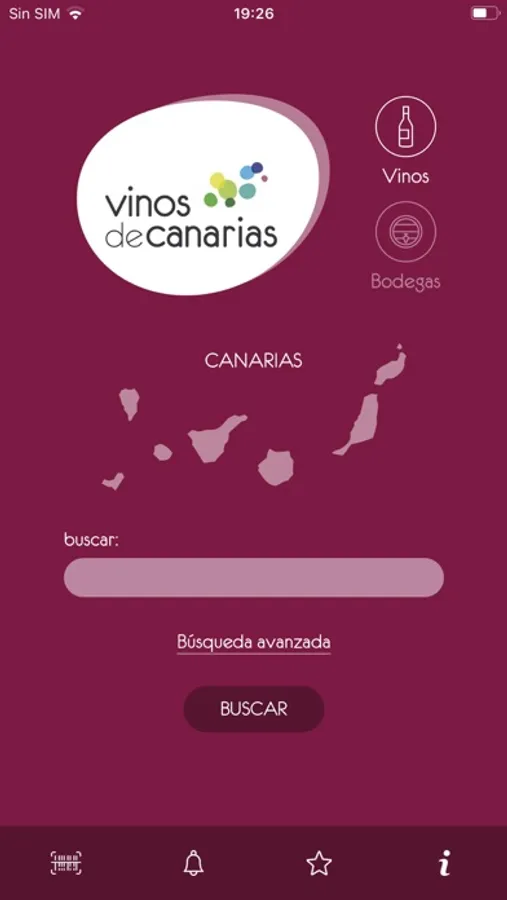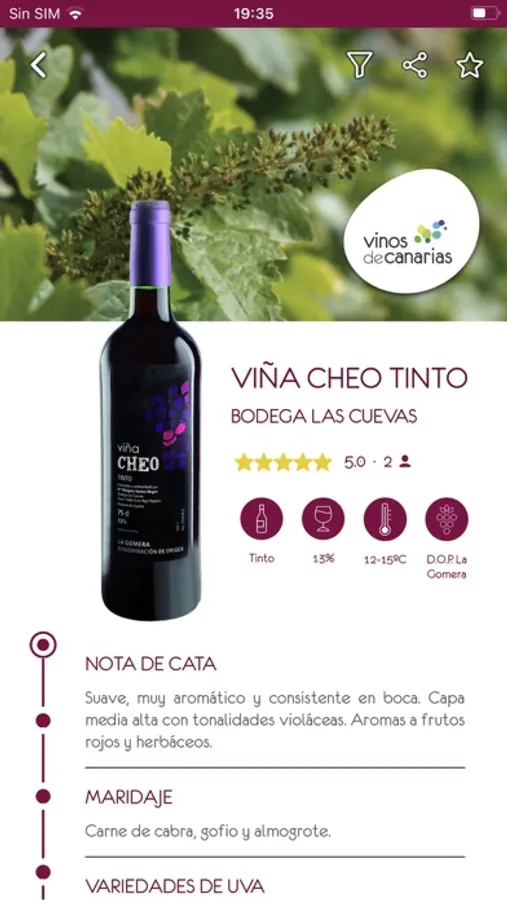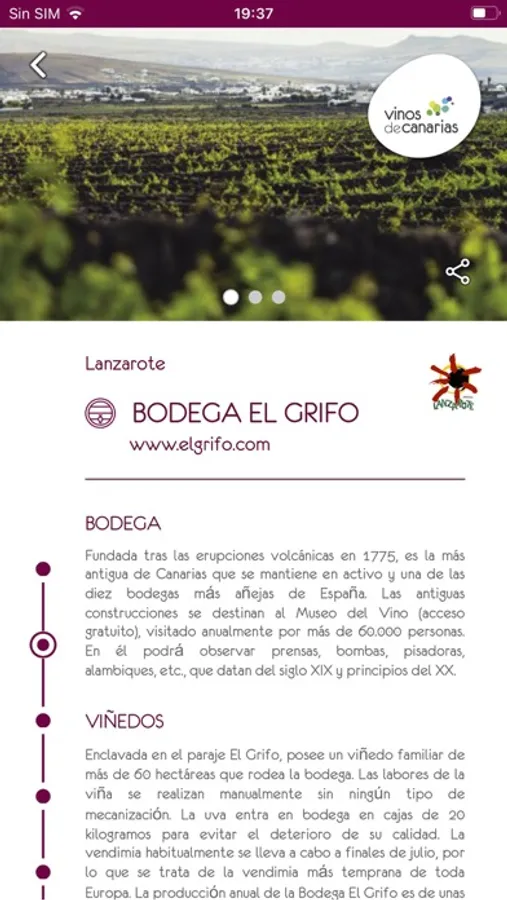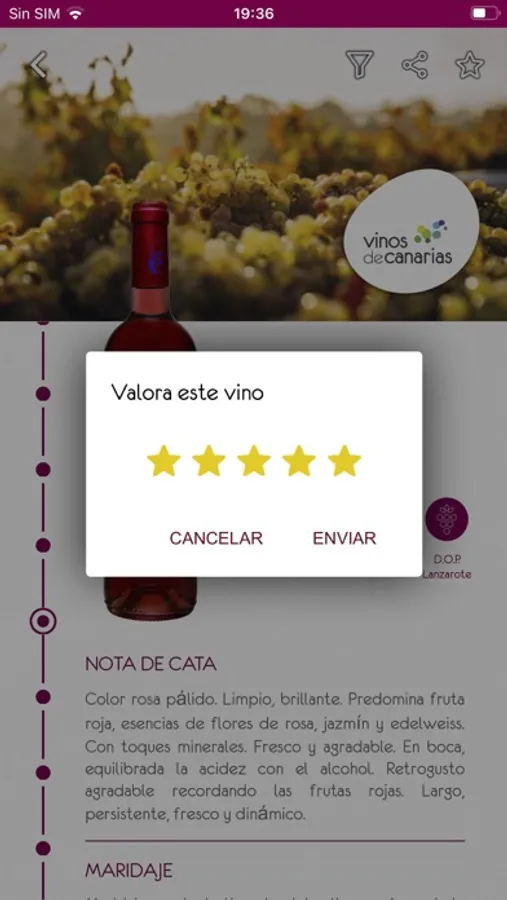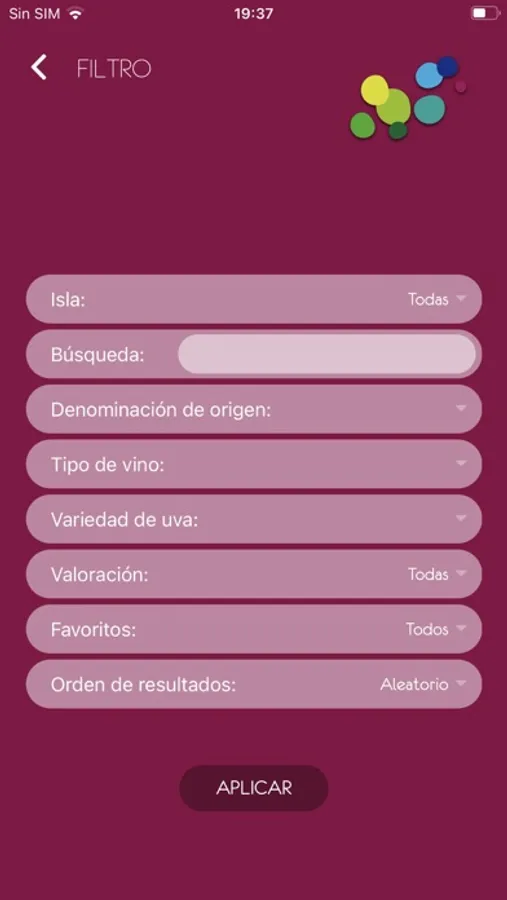About Vinos de Canarias
Canary Wines is the first mobile application that gives you access to all the archipelago's wineries with Protected Designation of Origin and its more than six hundred wine references. A simple and direct way to enter the interesting world of Canary wine and discover its benefits.
With our app you can:
- Access complete information about the Canarian wineries, including contact, services, location, etc.
- Find more than six hundred wine references, being able to search by islands, PDO, type of wine or variety of grape.
- Consult the general data of each wine, such as its tasting note, pairing, service, alcoholic strength, varieties or typology.
- Vote for your favorite wine and share it on social networks.
- Stay informed of all the news and events related to wine in the Canary Islands.
Canary Wines
Historically, the wines made in the Canary Islands had extraordinary worldwide recognition, filling the glasses of half the world both on one side of the Atlantic and the other. Shakespeare himself said of him that he "perfumed the soul." However, this prestige was warming up until recently, in which Canarian wine has progressively regained its leading role, once again claiming its place in the world wine market.
But the Islands not only offer wines of extraordinary quality, but at the same time, they do so from a wide variety of proposals. The diversity of landscapes, native grape varieties, traditional crops and soil and climate conditions, give our archipelago the ability to offer the consumer endless oenological experiences in a very specific context.
A tradition of centuries
Wine was not only a fundamental food for the settlers, but it also had a religious function of great importance, to the extent that without it the Christian liturgy could not be carried out. As a consequence, the first vines were introduced to the island from the first comment of colonization. However, it was not until the middle of the seventeenth century, after the collapse of the cultivation of sugar cane, when the vine reached its predominant role in the island economy, especially in the north of the island. Canarian wines were sold to the foreign markets, being highly coveted in countries like England.
Unique varieties
The Canary Archipelago has one of the most outstanding viticultural heritages in Spain. Because the Islands were unaffected by the phylloxera blight that swept through most of the planet in the late 19th century, grape varieties that have been completely disappeared elsewhere have survived here. This special circumstance has allowed a direct planting from vine shoots, with the oenological advantage of the development of its own roots. More than twenty of them are currently considered autochthonous.
Heroic viticulture
The abrupt and volcanic orography is a constant in the Archipelago, which has forced the Canarian viticulturist to effort and ingenuity to develop a heroic viticulture, given the impossibility of using any type of machinery in harvesting. According to the Center for Research, Studies, Safeguarding, Coordination and Valorisation of Mountain Viticulture (CERVIM), this type of viticulture is one in which the vineyards are located above 300 meters of altitude, on land with slopes greater than 30%, grown on terraces and / or located in difficult growing conditions.
Eleven Denominations of Origin
A Denomination of Origin grants legal recognition and protection to a quality wine made in a specific context and with certain modes of production and varieties of grapes. Given the varied climatic and natural conditions and even different cultural practices, the Canary Islands currently have eleven denominations of origin.
With our app you can:
- Access complete information about the Canarian wineries, including contact, services, location, etc.
- Find more than six hundred wine references, being able to search by islands, PDO, type of wine or variety of grape.
- Consult the general data of each wine, such as its tasting note, pairing, service, alcoholic strength, varieties or typology.
- Vote for your favorite wine and share it on social networks.
- Stay informed of all the news and events related to wine in the Canary Islands.
Canary Wines
Historically, the wines made in the Canary Islands had extraordinary worldwide recognition, filling the glasses of half the world both on one side of the Atlantic and the other. Shakespeare himself said of him that he "perfumed the soul." However, this prestige was warming up until recently, in which Canarian wine has progressively regained its leading role, once again claiming its place in the world wine market.
But the Islands not only offer wines of extraordinary quality, but at the same time, they do so from a wide variety of proposals. The diversity of landscapes, native grape varieties, traditional crops and soil and climate conditions, give our archipelago the ability to offer the consumer endless oenological experiences in a very specific context.
A tradition of centuries
Wine was not only a fundamental food for the settlers, but it also had a religious function of great importance, to the extent that without it the Christian liturgy could not be carried out. As a consequence, the first vines were introduced to the island from the first comment of colonization. However, it was not until the middle of the seventeenth century, after the collapse of the cultivation of sugar cane, when the vine reached its predominant role in the island economy, especially in the north of the island. Canarian wines were sold to the foreign markets, being highly coveted in countries like England.
Unique varieties
The Canary Archipelago has one of the most outstanding viticultural heritages in Spain. Because the Islands were unaffected by the phylloxera blight that swept through most of the planet in the late 19th century, grape varieties that have been completely disappeared elsewhere have survived here. This special circumstance has allowed a direct planting from vine shoots, with the oenological advantage of the development of its own roots. More than twenty of them are currently considered autochthonous.
Heroic viticulture
The abrupt and volcanic orography is a constant in the Archipelago, which has forced the Canarian viticulturist to effort and ingenuity to develop a heroic viticulture, given the impossibility of using any type of machinery in harvesting. According to the Center for Research, Studies, Safeguarding, Coordination and Valorisation of Mountain Viticulture (CERVIM), this type of viticulture is one in which the vineyards are located above 300 meters of altitude, on land with slopes greater than 30%, grown on terraces and / or located in difficult growing conditions.
Eleven Denominations of Origin
A Denomination of Origin grants legal recognition and protection to a quality wine made in a specific context and with certain modes of production and varieties of grapes. Given the varied climatic and natural conditions and even different cultural practices, the Canary Islands currently have eleven denominations of origin.
